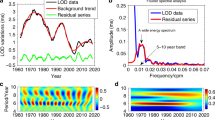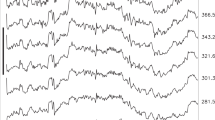Abstract
IN seeking for possible relationships between geomagnetism and atmospheric pressure, J. M. Stagg1 compared the mean diurnal pressure variation at Aberdeen on magnetically quiet days with that on magnetically disturbed days (five of each type per month) over the seven years 1922–28. His results—shown by the individual seasons and by the year as a whole—indicated a marked reduction of the forenoon pressure maximum and enhancement of the evening maximum on disturbed days as compared with quiet days, in the years of low sunspot number (1922–24): the change of type was absent, or even partly reversed, in the years of higher sunspot number (1925–28).
This is a preview of subscription content, access via your institution
Access options
Subscribe to this journal
Receive 51 print issues and online access
$199.00 per year
only $3.90 per issue
Buy this article
- Purchase on Springer Link
- Instant access to full article PDF
Prices may be subject to local taxes which are calculated during checkout
Similar content being viewed by others
References
Stagg, J. M., Nature, 127, 402 (1931).
Chapman, S., and Bartels, J., Geomagnetism, 1, 204 (1940).
Author information
Authors and Affiliations
Rights and permissions
About this article
Cite this article
LEWIS, R., McINTOSH, D. Atmospheric Pressure and Geomagnetic Disturbance. Nature 169, 1059–1060 (1952). https://doi.org/10.1038/1691059a0
Issue Date:
DOI: https://doi.org/10.1038/1691059a0
Comments
By submitting a comment you agree to abide by our Terms and Community Guidelines. If you find something abusive or that does not comply with our terms or guidelines please flag it as inappropriate.



